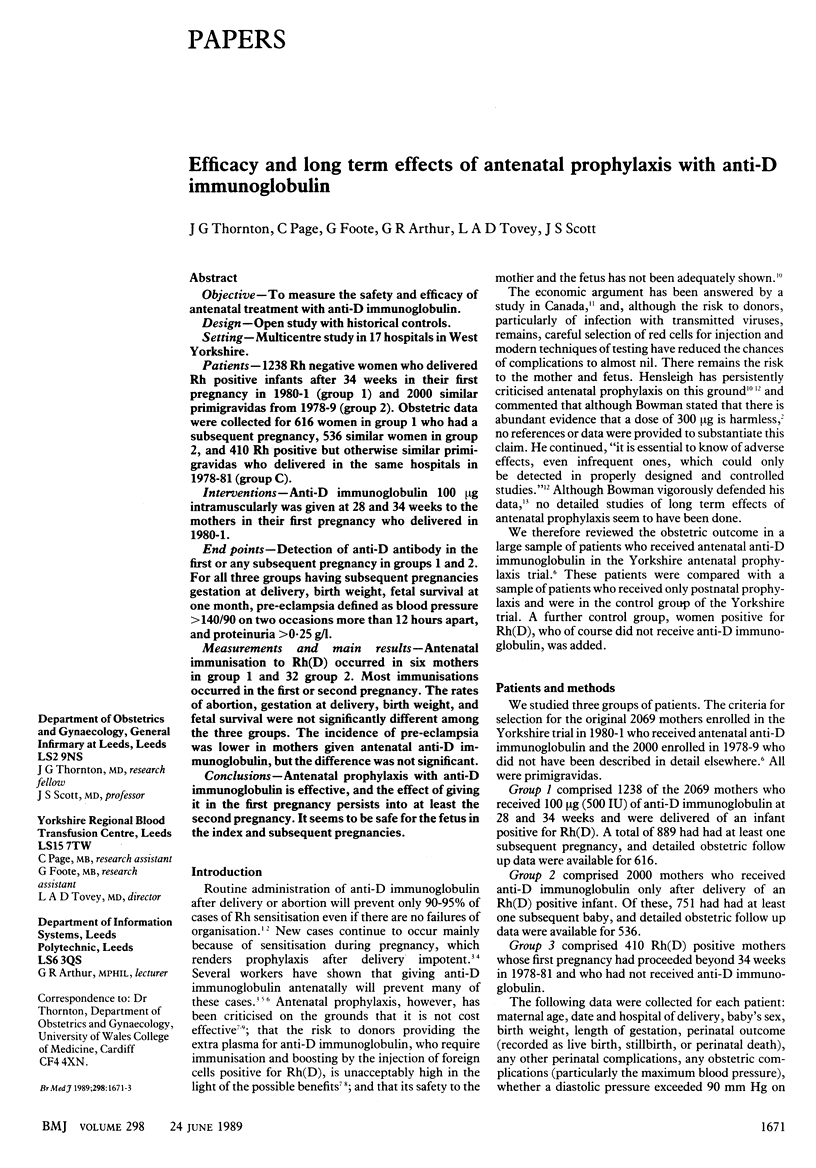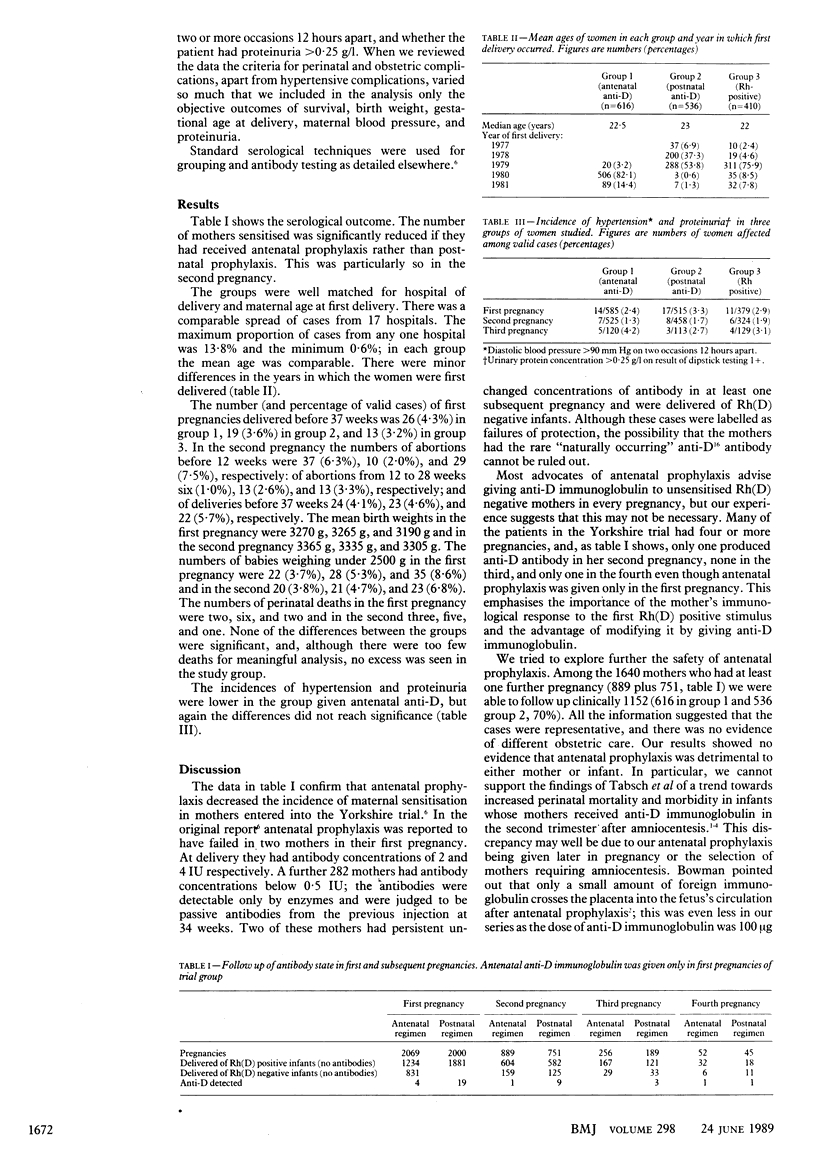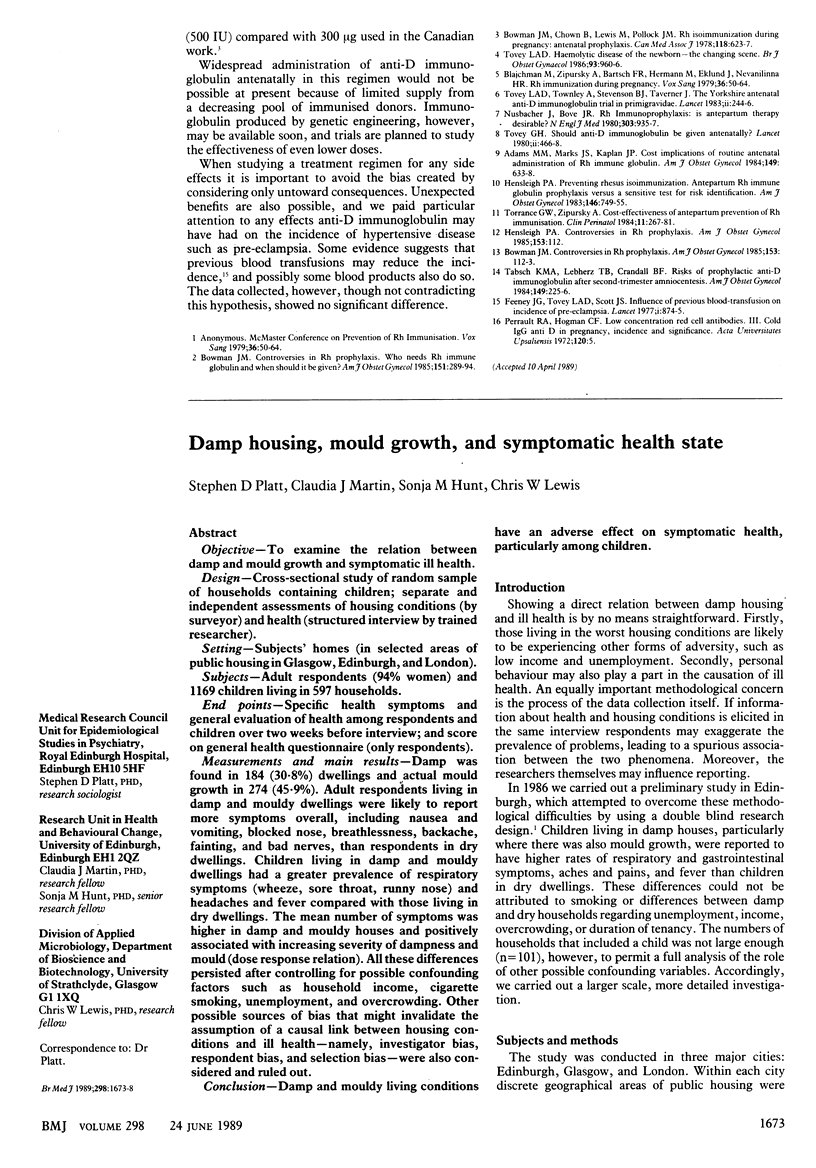Abstract
OBJECTIVE--To measure the safety and efficacy of antenatal treatment with anti-D immunoglobulin. DESIGN--Open study with historical controls. SETTING--Multicentre study in 17 hospitals in West Yorkshire. PATIENTS--1238 Rh negative women who delivered Rh positive infants after 34 weeks in their first pregnancy in 1980-1 (group 1) and 2000 similar primigravidas from 1978-9 (group 2). Obstetric data were collected for 616 women in group 1 who had a subsequent pregnancy, 536 similar women in group 2, and 410 Rh positive but otherwise similar primigravidas who delivered in the same hospitals in 1978-81 (group C). INTERVENTIONS--Anti-D immunoglobulin 100 micrograms intramuscularly was given at 28 and 34 weeks to the mothers in their first pregnancy who delivered in 1980-1. END POINTS--Detection of anti-D antibody in the first or any subsequent pregnancy in groups 1 and 2. For all three groups having subsequent pregnancies gestation at delivery, birth weight, fetal survival at one month, pre-eclampsia defined as blood pressure greater than 140/90 on two occasions more than 12 hours apart, and proteinuria greater than 0.25 milligram. MEASUREMENTS AND MAIN RESULTS--Antenatal immunisation to Rh(D) occurred in six mothers in group 1 and 32 group 2. Most immunisations occurred in the first or second pregnancy. The rates of abortion, gestation at delivery, birth weight, and fetal survival were not significantly different among the three groups. The incidence of pre-eclampsia was lower in mothers given antenatal anti-D immunoglobulin, but the difference was not significant. CONCLUSIONS--Antenatal prophylaxis with anti-D immunoglobulin is effective, and the effect of giving it in the first pregnancy persists into at least the second pregnancy. It seems to be safe for the fetus in the index and subsequent pregnancies.
Full text
PDF


Selected References
These references are in PubMed. This may not be the complete list of references from this article.
- Adams M. M., Marks J. S., Koplan J. P. Cost implications of routine antenatal administration of Rh immune globulin. Am J Obstet Gynecol. 1984 Jul 15;149(6):633–638. doi: 10.1016/0002-9378(84)90248-5. [DOI] [PubMed] [Google Scholar]
- Bowman J. M., Chown B., Lewis M., Pollock J. M. Rh isoimmunization during pregnancy: antenatal prophylaxis. Can Med Assoc J. 1978 Mar 18;118(6):623–627. [PMC free article] [PubMed] [Google Scholar]
- Bowman J. M. Controversies in Rh prophylaxis. Who needs Rh immune globulin and when should it be given? Am J Obstet Gynecol. 1985 Feb 1;151(3):289–294. doi: 10.1016/0002-9378(85)90288-1. [DOI] [PubMed] [Google Scholar]
- Feeney J. G., Tovey L. A., Scott J. S. Influence of previous blood-transfusion on incidence of pre-eclampsia. Lancet. 1977 Apr 23;1(8017):874–875. doi: 10.1016/s0140-6736(77)91199-0. [DOI] [PubMed] [Google Scholar]
- Hensleigh P. A. Controversies in Rh prophylaxis. Am J Obstet Gynecol. 1985 Sep 1;153(1):112–113. doi: 10.1016/0002-9378(85)90606-4. [DOI] [PubMed] [Google Scholar]
- Hensleigh P. A. Controversies in Rh prophylaxis. Am J Obstet Gynecol. 1985 Sep 1;153(1):112–113. doi: 10.1016/0002-9378(85)90606-4. [DOI] [PubMed] [Google Scholar]
- Hensleigh P. A. Preventing rhesus isoimmunization. Antepartum Rh immune globulin prophylaxis versus a sensitive test for risk identification. Am J Obstet Gynecol. 1983 Aug 1;146(7):749–755. [PubMed] [Google Scholar]
- McMaster conference on prevention of Rh immunization. 28-30 September, 1977. Vox Sang. 1979;36(1):50–64. [PubMed] [Google Scholar]
- Nusbacher J., Bove J. R. Sound boards. Rh immunoprophylaxis: is antepartum therapy desirable? N Engl J Med. 1980 Oct 16;303(16):935–937. doi: 10.1056/NEJM198010163031610. [DOI] [PubMed] [Google Scholar]
- Tabsh K. M., Lebherz T. B., Crandall B. F. Risks of prophylactic anti-D immunoglobulin after second-trimester amniocentesis. Am J Obstet Gynecol. 1984 May 15;149(2):225–226. doi: 10.1016/0002-9378(84)90202-3. [DOI] [PubMed] [Google Scholar]
- Torrance G. W., Zipursky A. Cost-effectiveness of antepartum prevention of Rh immunization. Clin Perinatol. 1984 Jun;11(2):267–281. [PubMed] [Google Scholar]
- Tovey G. H. Should anti-D immunoglobulin be given antenatally? Lancet. 1980 Aug 30;2(8192):466–468. doi: 10.1016/s0140-6736(80)91898-x. [DOI] [PubMed] [Google Scholar]
- Tovey L. A. Haemolytic disease of the newborn--the changing scene. Br J Obstet Gynaecol. 1986 Sep;93(9):960–966. doi: 10.1111/j.1471-0528.1986.tb08016.x. [DOI] [PubMed] [Google Scholar]
- Tovey L. A., Townley A., Stevenson B. J., Taverner J. The Yorkshire antenatal anti-D immunoglobulin trial in primigravidae. Lancet. 1983 Jul 30;2(8344):244–246. doi: 10.1016/s0140-6736(83)90232-5. [DOI] [PubMed] [Google Scholar]


